七上Unit 5 学案
- 格式:doc
- 大小:79.00 KB
- 文档页数:6
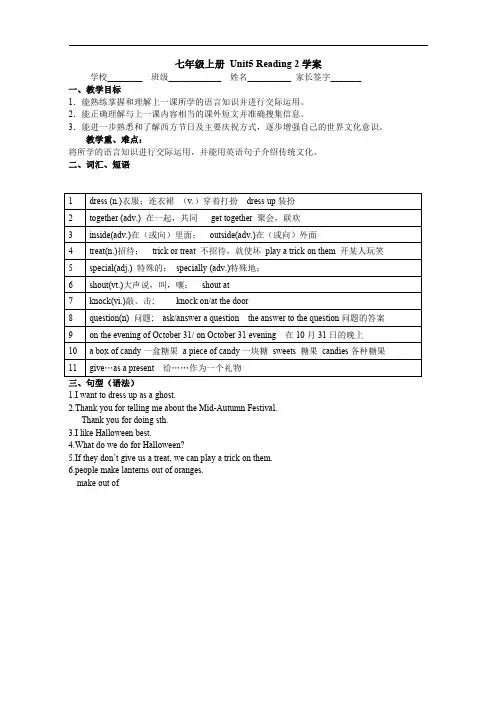
学校________班级____________姓名__________家长签字_______一、教学目标1.能熟练掌握和理解上一课所学的语言知识并进行交际运用。
2.能正确理解与上一课内容相当的课外短文并准确搜集信息。
3.能进一步熟悉和了解西方节日及主要庆祝方式,逐步增强自己的世界文化意识。
教学重、难点:将所学的语言知识进行交际运用,并能用英语句子介绍传统文化。
二、词汇、短语1dress(n.)衣服;连衣裙(v.)穿着打扮dress up装扮2together(adv.)在一起,共同get together聚会,联欢3inside(adv.)在(或向)里面;outside(adv.)在(或向)外面4treat(n.)招待;trick or treat不招待,就使坏play a trick on them开某人玩笑5special(adj.)特殊的;specially(adv.)特殊地;6shout(vt.)大声说,叫,嚷;shout at7knock(vi.)敲、击;knock on/at the door8question(n)问题;ask/answer a question the answer to the question问题的答案9on the evening of October31/on October31evening在10月31日的晚上10a box of candy一盒糖果a piece of candy一块糖sweets糖果candies各种糖果11give…as a present给……作为一个礼物三、句型(语法)1.I want to dress up as a ghost.2.Thank you for telling me about the Mid-Autumn Festival.Thank you for doing sth.3.I like Halloween best.4.What do we do for Halloween?5.If they don’t give us a treat,we can play a trick on them.6.people make lanterns out of oranges.make out of主备:赵昌慧审核:日期:2018.8.1学校________班级____________姓名__________家长签字_______【课前导学】(一)认真阅读课文,相信你就能把下列短语译成英语:1.敲门2.举办一个特殊的聚会3.对……搞恶作剧4.把他们的脸涂上颜色5.装扮成鬼6.谢谢做某事___________________7.在万圣节化妆________8.你最喜爱的节日9.让我们一起庆祝______10.在十月三十一日的晚上_______________11.用一些糖果招待他们______________________________________________12.举行一次特殊的晚会______________13.招待我们______________________14.玩一个叫做“不招待就使坏”的游戏_____________________________15.当夜幕降临时____________________________________16.用南瓜做灯笼________________________(二)根据句意和汉语,完成句中所缺单词。
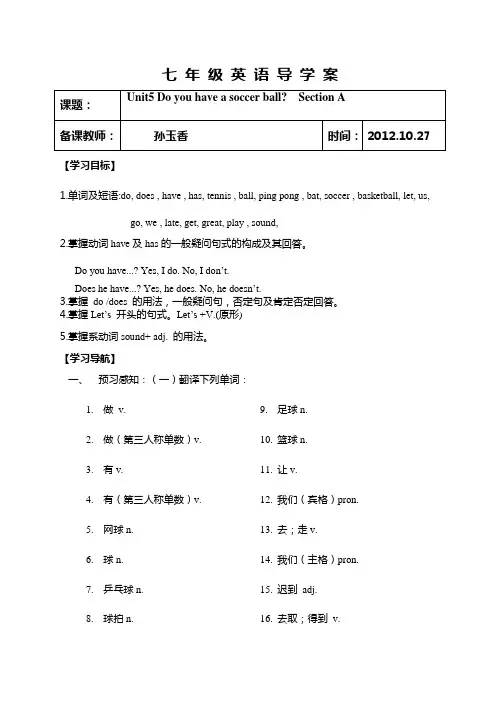
七年级英语导学案【学习目标】1.单词及短语:do, does , have , has, tennis , ball, ping pong , bat, soccer , basketball, let, us,go, we , late, get, great, play , sound,2.掌握动词have及has的一般疑问句式的构成及其回答。
Do you have...? Yes, I do. No, I don’t.Does he have...? Yes, he does. No, he doesn’t.3.掌握do /does的用法,一般疑问句,否定句及肯定否定回答。
4.掌握Let’s开头的句式。
Let’s +V.(原形)5.掌握系动词sound+ adj. 的用法。
【学习导航】一、预习感知:(一)翻译下列单词:1.做v.2.做(第三人称单数)v.3.有v.4.有(第三人称单数)v.5.网球n.6.球n.7.乒乓球n.8.球拍n.9.足球n.10.篮球n.11.让v.12.我们(宾格)pron. 13.去;走v.14.我们(主格)pron.15.迟到adj.16.去取;得到v.17.美妙的;伟大的adj.18.玩耍;参加v.19.听起来好像v.20.有趣的adj21. do not =___________22. does not=___________23. have not=___________24. has not =____________(二)翻译下列词组或搭配:1打乒乓球2打篮球3踢足球4打棒球5打网球6打排球7参加运动8棒球拍9乒乓球拍10我们的棒球拍11听起来好12我有…13你有…14他有…15她有…16它有…17王林有…18我们有…19你们有…20他们有…21我做…22你做…23他做…24她做…25他做…26张梅做…27我们做…28你们做…29他们做…30王林和我做…二、合作探究:(一、)句型:1. Do you have …? 你有..吗?如:Do you have a soccer ball?Yes, I do. 是的,我有。
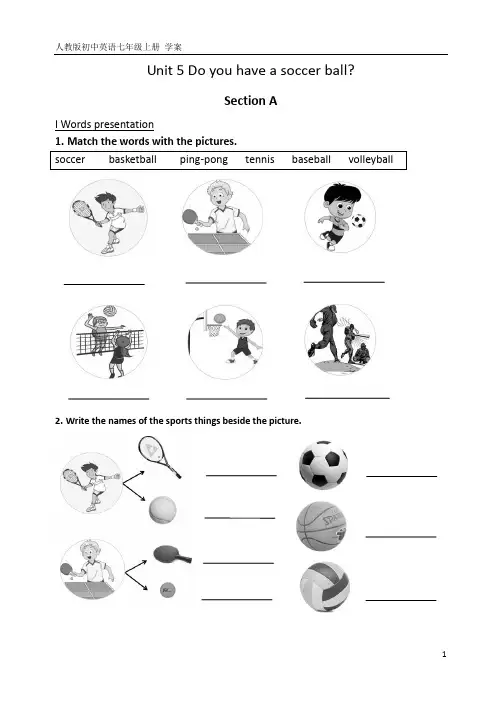
Unit 5 Do you have a soccer ball?Section AI Words presentation2.Write the names of the sports things beside the picture.II Pair work:1.Talk about the sports in pairs.A: Do you like ...?B: Yes, I do. /No, I don’t.A: Do you have ...?B: Yes, I do. /No, I don’t.2.Now, please write down the information and your partner. (下面请写下你搭档的信息) __________likes ___________, but he/she doesn’t like ___________.__________has a __________, but he/she doesn’t have a ____________.III Listening tasks:1.Listen and match the picture with the balls.2.Listen again, complete the questions and answers.1) _____ you ______ a soccer ball, Paul?_____, I ______. But my brother Alan does.2) _____ you ______ a basketball, Mike?_____, I ______.3) ______ Jane ______ a tennis ball?_____, she ______.4) ______ Dale ______ a volleyball?______, he ______. But his brother _______.3.Conclusion: Now, complete the sentences with the words in the box.1. Paul __________ a soccer ball, but his brother Alan ______ one.2. John wants to play basketball, and Mike ______ a basketball.3. Sally wants to play tennis, but Jane ___________ a tennis ball.4. Dale __________ a volleyball, but his brother ________. He and Frank will go and ______ him.IV Role-play2. Make up a similar dialogue in pairs.A: Hey, _________, Let’s play ________.B: OK!/All right.A: Do ou have the ____________?B: Yes, I do. It’s ______________.A: And where’s our _____________?B: ...(Let me get it!)(Let’s go!)V. Grammer Focus3b. Fill in the blanks with do or does.Key points:Great!意思是__________.That sounds good. 意思是_______________.句型转换:1. I have a red notebook. (改为一般疑问句并做肯定回答)______ you ______ a red notebook?______, I ______.2. He has a basketball. (改为一般疑问句并做否定回答)______ he ______ a baskeball?______, he _______.3. My teacher plays tennis well?(改为一般疑问句)_____ your teacher _______ tennis well?4.Does he have a baseball?(改为复数句)VI Complete the passage and try to retell it.Hi, I’m Jenny. I l_______ sports very much. I p______ basketball very day. I h______ two basketballs. I often p_______ it with my classmates _____________(放学后).This is my friend Cindy. We are ______________________(在同一所学校), but in different classes. She l________ sports, too. She _____________ basketball. She thinks it’s hard. She p_______ tennis every day, because it’s easy for her. She has four ______________ (网球) and a tennis racket. ______ you like sports? ___________________together (让我们一起运动吧)! The answers:1. ________2. ________3. ________4. _________5. ________________6. _________________________7. ________8. _____________ 9. ________ 10. _____________ 11. _______ 12. __________________Section BI Speaking task:1. Look at the picture in 3c on page 27, ask and answer in pairs.A: Does Bob have a ...?B: ...A: Where is/are the ...?B: It’s/They’re ...2. Now, write some sentences to describe Bob’s room.Bob’s room is ________(tidy/untidy). Look, his ______ is ________________. His _______ are _________________. He has ___________, it’s _________________. He has _________, They’re __________________.II words presentation 1. write phrases of the activities below the pictures)2. What do you think of the activities? Write the adjectives in the box under the pictures.______________________________________________________________________________________________________________________________________III Pair work:1. Ask and answer the questions in pairs.A: Do you often play computer games?B: Yes, I do. / No, I don’t. I think it’s ...2. Now, write some sentences about the activities you and your friends do in your free time.I often ________________ in my free time. I think ______________________. I don’t ______________. I think\don’t think ___________________________._________ is my friend. He/she often _____________________ in his\her free time. He\She thinks ___________________________. He\she doesn’t often __________________. He\She thinks\doesn’t think ____________________________.IV Listening tasks:1. Listen and match the activities with the opinions.2. Work in pairs, make up a dialogue to talk about what you want to do. A: Hi! ... Let’s play ...!B: That sounds ..., Besides, I don’t have ...A: Do you have ...?B: ...A: Then, let’s ...B: ...V Reading tasks:1.Read the survey results in a school magazine and complete the table.Report in complete sentences. (use and or but to connect the two sentences.)2.Read again and answer the questions.1) Do Frank and Alan go to the same school?___________________________________________________2) What does Frank think of soccer?___________________________________________________3) How does Gina like sports?___________________________________________________4) Why doesn't Wang Wei like soccer?___________________________________________________5) What sport does Wang Wei like? Why?___________________________________________________6) When does Wang Wei play ping-pong, and who does he play with?___________________________________________________VI Complete the passage and try to retell it.David and I _______________________(上同一所学校). He l_______ sports very much. He has two s_________ ball and a basketball. He a_______ plays basketballs ___________(在学校). He thinks it's r__________ for him. I like basketball, too. But I ________ play it, I only w________ it on TV. My f_________ sport is ping-pong. __________________(它对我来说很容易). I have three ping-pong balls and two ping-pong b______. ___________(课后), I play ping-pong ______________(和我的同学).The answers:1. _________________________2. ___________3. ____________4. ___________5. ________________6. ____________7. ____________8. ____________9. _____________ 10. ____________________________ 11. _________12. _______________ 13. ________________单元写作假如你是Bill, 请介绍你和你哥哥Bob的运动爱好。
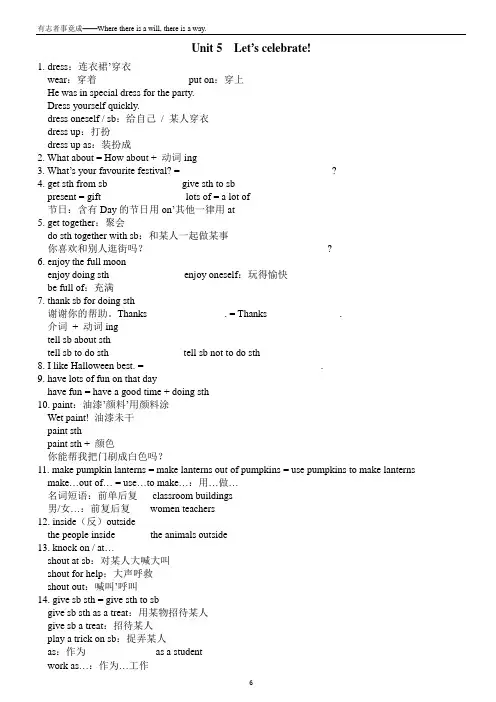
Unit 5 Let’s celebrate!1. dress:连衣裙’穿衣wear:穿着put on:穿上He was in special dress for the party.Dress yourself quickly.dress oneself / sb:给自己/ 某人穿衣dress up:打扮dress up as:装扮成2. What about = How about + 动词ing3. What’s your favourite festival? = ______________________________?4. get sth from sb give sth to sbpresent = gift lots of = a lot of节日:含有Day的节日用on’其他一律用at5. get together:聚会do sth together with sb:和某人一起做某事你喜欢和别人逛街吗?____________________________________?6. enjoy the full moonenjoy doing sth enjoy oneself:玩得愉快be full of:充满7. thank sb for doing sth谢谢你的帮助。
Thanks _______________. = Thanks ______________.介词+ 动词ingtell sb about sthtell sb to do sth tell sb not to do sth8. I like Halloween best. = ___________________________________.9. have lots of fun on that dayhave fun = have a good time + doing sth10. paint:油漆’颜料’用颜料涂Wet paint! 油漆未干paint sthpaint sth + 颜色你能帮我把门刷成白色吗?______________________________11. make pumpkin lanterns = make lanterns out of pumpkins = use pumpkins to make lanterns make…out of… = use…to make…:用…做…名词短语:前单后复classroom buildings男/女…:前复后复women teachers12. inside(反)outsidethe people inside the animals outside13. knock on / at…shout at sb:对某人大喊大叫shout for help:大声呼救shout out:喊叫’呼叫14. give sb sth = give sth to sbgive sb sth as a treat:用某物招待某人give sb a treat:招待某人play a trick on sb:捉弄某人as:作为as a studentwork as…:作为…工作我叔叔经常用美食招待我。
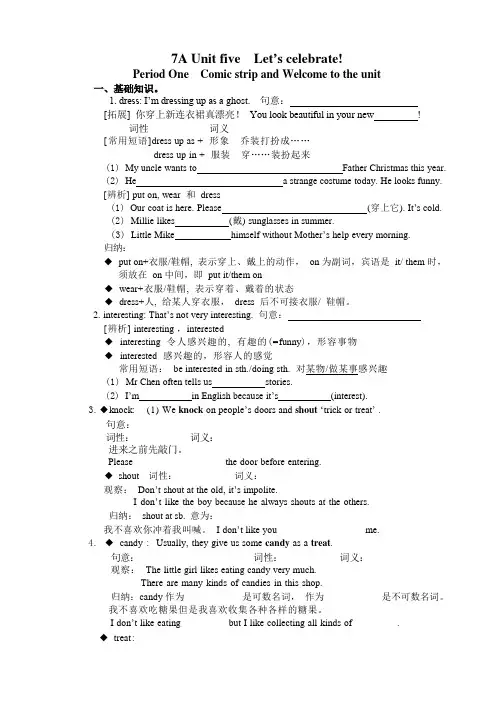
7A Unit five Let’s celebrate!Period One Comic strip and Welcome to the unit1. dress: I’m dressing up as a ghost. 句意:[拓展] 你穿上新连衣裙真漂亮!You look beautiful in your new !词性_________ 词义_________[常用短语]dress up as + 形象乔装打扮成……dress up in + 服装穿……装扮起来(1) My uncle wants to Father Christmas this year.(2) He a strange costume today. He looks funny.[辨析] put on, wear 和dress(1) Our coat is here. Please (穿上它). It’s cold.(2) Millie likes (戴) sunglasses in summer.(3) Little Mike himself without Mother’s help every morning.归纳:◆ put on+衣服/鞋帽, 表示穿上、戴上的动作,on 为副词,宾语是it/ them 时,须放在on 中间,即put it/them on◆ wear+衣服/鞋帽, 表示穿着、戴着的状态◆ dress+人, 给某人穿衣服,dress 后不可接衣服/ 鞋帽。
2. interesting: That’s not very interesting. 句意:[辨析] interesting ,interested◆interesting 令人感兴趣的, 有趣的(=funny),形容事物◆interested 感兴趣的,形容人的感觉常用短语:be interested in sth./doing sth. 对某物/做某事感兴趣(1) Mr Chen often tells us stories.(2) I’m in English because it’s (interest).3.◆knock: (1) We knock on people’s doors and shout‘trick or treat’ .句意:______________________________________________________词性:________ 词义:________进来之前先敲门。
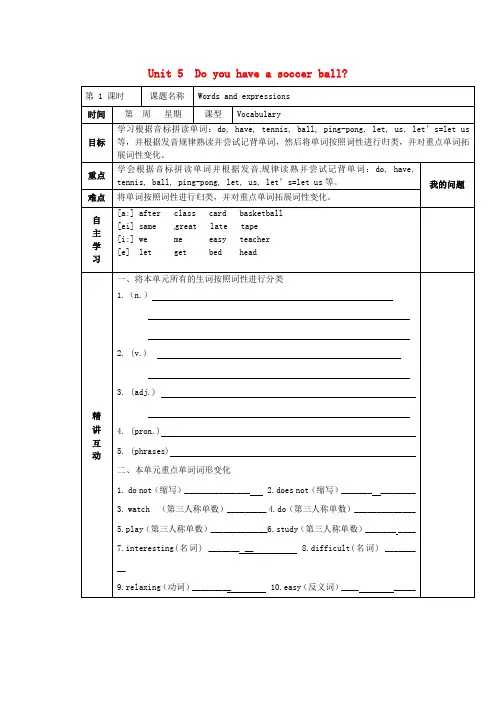
Unit 5 Do you have a soccer ball? 第 1 课时课题名称Words and expressions时间第周星期课型Vocabulary目标学习根据音标拼读单词:do, have, tennis, ball, ping-pong, let, us, let’s=let us 等,并根据发音规律熟读并尝试记背单词,然后将单词按照词性进行归类,并对重点单词拓展词性变化。
重点学会根据音标拼读单词并根据发音规律读熟并尝试记背单词:do, have,tennis, ball, ping-pong, let, us, let’s=let us等。
我的问题难点将单词按照词性进行归类,并对重点单词拓展词性变化。
自主学习[a:] after class card basketball [ei] same great late tape [i:] we me easy teacher [e] let get bed head精讲互动一、将本单元所有的生词按照词性进行分类1.(n.)2. (v.)3. (adj.)4. (pron.)5. (phrases)二、本单元重点单词词形变化1. do not(缩写)_______________2.does not(缩写)_______ ________3.watch (第三人称单数)_________4.do(第三人称单数)______________5.play(第三人称单数)_____________6.study(第三人称单数)_______ ____7.interesting(名词) _______ __ 8.difficult(名词) _______ __9.relaxing(动词)_________ 10.easy(反义词)____ _____达标训练I. 翻译下列词语篮球_______________ 棒球________________ 排球_____________ _ 足球_______________ 乒乓球_____________ 网球________________ 打乒乓球________________ 打篮球________________ 踢足球_________________ 打棒球___________________ 打网球_____________________ 打排球_______________ ___ 参加运动__________ ______II. 根据句意及首字母补全单词(1)Is that his b________ bat.(2)This is a pencil c_______(3)What's this ? It's a r______(4)E______me. Is this your pencil?III.连词成句1. you, do, soccer, have, ball, a.__________________________ ______2. brother, his, does, have, t ennis, a, racket ._____________________________ ___3. don’t, they, have, soccer, a, ball.______________________________ __作业小结Ⅱ.翻译下列句子1.你有乒乓球吗? __________________________________________2.他有排球吗? _____________________________________________3我爸爸没有电脑。
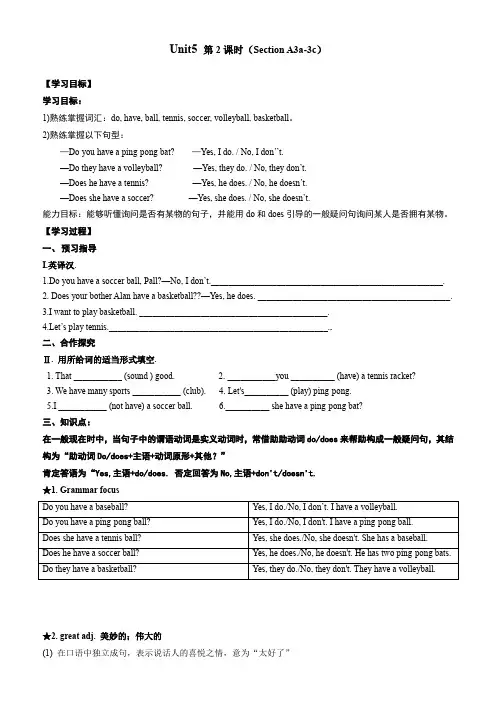
Unit5 第2课时(Section A3a-3c)【学习目标】学习目标:1)熟练掌握词汇:do, have, ball, tennis, soccer, volleyball, basketball。
2)熟练掌握以下句型:—Do you have a ping-pong bat? —Yes, I do. / No, I don’’t.—Do they have a volleyball? —Yes, they do. / No, they don’t.—Does he have a tennis? —Yes, he does. / No, he doesn’t.—Does she have a soccer? —Yes, she does. / No, she doesn’t.能力目标:能够听懂询问是否有某物的句子,并能用do和does引导的一般疑问句询问某人是否拥有某物。
【学习过程】一、预习指导I.英译汉.1.Do you have a soccer ball, Pall?—No, I don’t._____________________________________________________.2. Does your bother Alan have a basketball??—Yes, he does. ____________________________________________.3.I want to play basketball. ___________________________________________.4.Let’s play tennis.__________________________________________________..二、合作探究Ⅱ. 用所给词的适当形式填空.1. That ___________ (sound ) good.2. ___________you __________ (have) a tennis racket?3. We have many sports ___________ (club).4. Let's__________ (play) ping-pong.5.I ___________ (not have) a soccer ball.6.__________ she have a ping-pong bat?三、知识点:在一般现在时中,当句子中的谓语动词是实义动词时,常借助助动词do/does来帮助构成一般疑问句,其结构为“助动词Do/does+主语+动词原形+其他?”肯定答语为“Yes,主语+do/does. 否定回答为No,主语+don't/doesn't.★1.Grammar focus★2.great adj. 美妙的;伟大的(1) 在口语中独立成句,表示说话人的喜悦之情,意为“太好了”e.g.--Let's play basketball.让我们一起去打篮球吧。
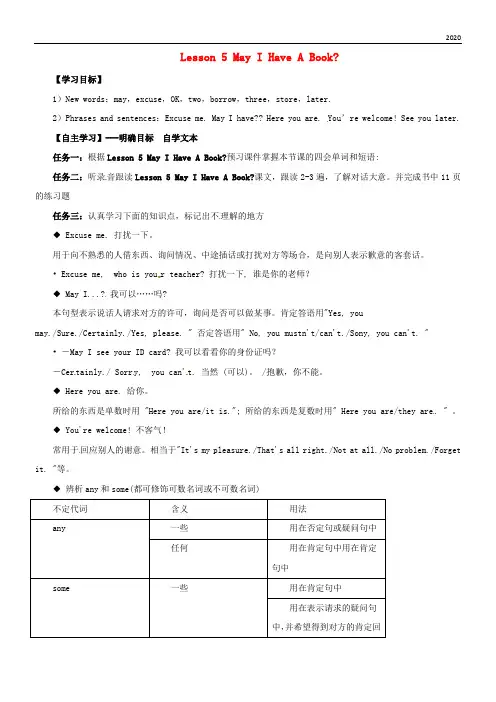
Lesson 5 May I Have A Book?【学习目标】1)New words:may,excuse,OK,two,borrow,three,store,later.2)Phrases and sentences:Excuse me. May I have?? Here you are. You’re welcome! See you later.【自主学习】---明确目标自学文本任务一:根据Lesson 5 May I Have A Book?预习课件掌握本节课的四会单词和短语:任务二:听录音跟读Lesson 5 May I Have A Book?课文,跟读2-3遍,了解对话大意。
并完成书中11页的练习题任务三:认真学习下面的知识点,标记出不理解的地方◆ Excuse me. 打扰一下。
用于向不熟悉的人借东西、询问情况、中途插话或打扰对方等场合,是向别人表示歉意的客套话。
• Excuse me, who is you r teacher? 打扰一下, 谁是你的老师?◆ May I...? 我可以……吗?本句型表示说话人请求对方的许可,询问是否可以做某事。
肯定答语用"Yes, youmay./Sure./Certainly./Yes, please. " 否定答语用" No, you mustn't/can't./Sony, you can't. "• -May I see your ID card? 我可以看看你的身份证吗?-Cer tainly./ Sorr y, you can't. 当然 (可以)。
/抱歉,你不能。
◆ Here you are. 给你。
所给的东西是单数时用 "Here you are/it is."; 所给的东西是复数时用" Here you are/they are. " 。
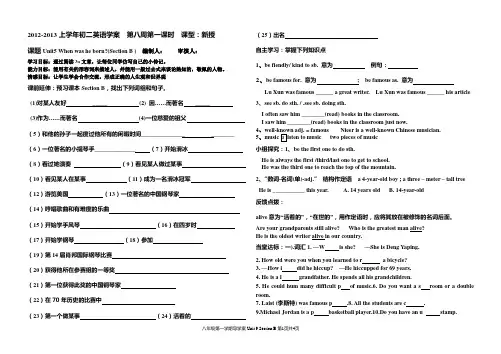
2012-2013上学年初二英语学案第八周第一课时课型:新授课题Unit5 When was he born?(Section B ) 编制人:审核人:学习目标:通过阅读3a文章,让每位同学仿写自己的小传记。
能力目标:能用有关的形容词来描述人,并能用一般过去式来谈论熟知的,敬佩的人物。
情感目标:让学生学会合作交流,形成正确的人生观和世界观课前延伸:预习课本Section B,找出下列词组和句子。
(1)对某人友好_____ (2) 因……而著名_____(3)作为……而著名(4)一位慈爱的祖父(5)和他的孙子一起度过他所有的闲暇时间_______________ ________ (6)一位著名的小提琴手______________ (7)开始滑冰(8)看过她演奏(9)看见某人做过某事(10)看见某人在某事(11)成为一名滑冰冠军(12)游览美国(13)一位著名的中国钢琴家(14)哼唱歌曲和有难度的乐曲(15)开始学手风琴(16)在四岁时(17)开始学钢琴(18)参加(19)第14届肖邦国际钢琴比赛(20)获得他所在参赛组的一等奖(21)第一位获得此奖的中国钢琴家(22)在70年历史的比赛中(23)第一个做某事(24)活着的(25)出名自主学习:掌握下列知识点1、be fiendly/ kind to sb. 意为例句:2、be famous for. 意为; be famous as. 意为Lu Xun was famous ______ a great writer. Lu Xun was famous ______ his article3、see sb. do sth. / .see sb. doing sth.I often saw him ________(read) books in the classroom.I saw him ________(read) books in the classroom just now.4、Nieer is a well-known Chinese musician.5、two pieces of music、be the first one to do sth.He is always the first /third/last one to get to school.He was the third one to reach the top of the mountain.2、“数词-名词(单)-adj.”结构作定语 a 4-year-old boy ; a three – meter – tall tree He is ___________ this year. A. 14 years old B. 14-year-old 反馈点拨:alive意为―活着的‖,―在世的‖,用作定语时,应将其放在被修饰的名词后面。
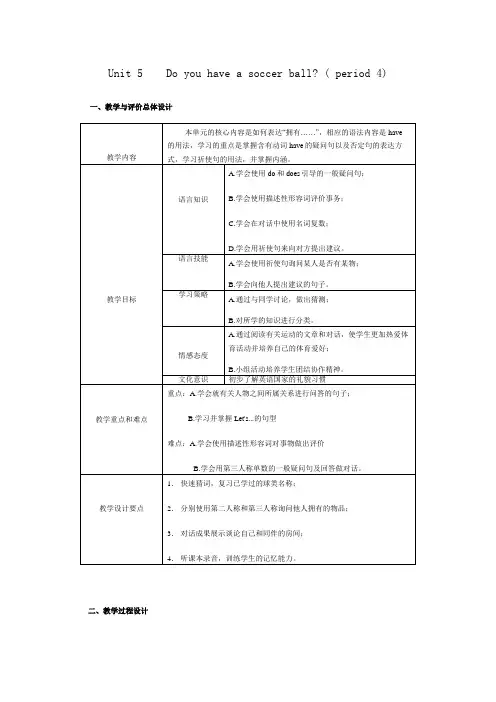
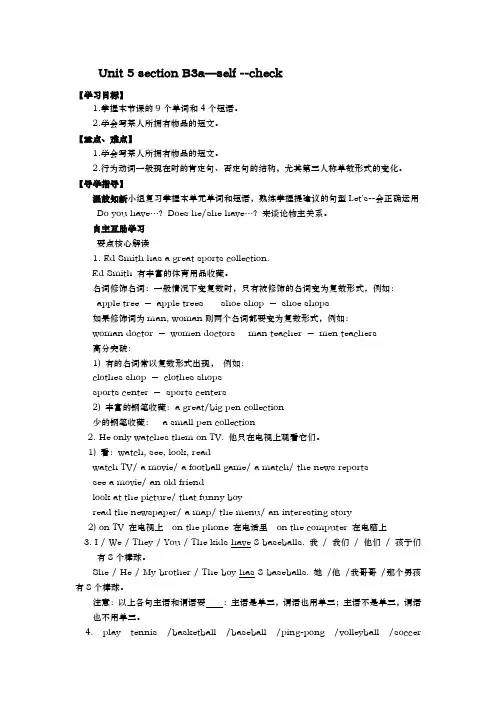
Unit 5 section B3a—self --check【学习目标】1.掌握本节课的9个单词和4个短语。
2.学会写某人所拥有物品的短文。
【重点、难点】1.学会写某人所拥有物品的短文。
2.行为动词一般现在时的肯定句、否定句的结构,尤其第三人称单数形式的变化。
【导学指导】温故知新小组复习掌握本单元单词和短语,熟练掌握提建议的句型Let's--会正确运用Do you have…?Does he/she have…?来谈论物主关系。
自主互助学习要点核心解读1. Ed Smith has a great sports collection.Ed Smith 有丰富的体育用品收藏。
名词修饰名词:一般情况下变复数时,只有被修饰的名词变为复数形式,例如:apple tree -apple trees shoe shop -shoe shops如果修饰词为man, woman则两个名词都要变为复数形式,例如:woman doctor -women doctors man teacher -men teachers高分突破:1) 有的名词常以复数形式出现,例如:clothes shop -clothes shopssports center -sports centers2) 丰富的钢笔收藏:a great/big pen collection少的钢笔收藏: a small pen collection2. He only watches them on TV. 他只在电视上观看它们。
1) 看:watch, see, look, readwatch TV/ a movie/ a football game/ a match/ the news reportssee a movie/ an old friendlook at the picture/ that funny boyread the newspaper/ a map/ the menu/ an interesting story2) on TV 在电视上on the phone 在电话里on the computer 在电脑上3. I / We / They / You / The kids have 8 baseballs. 我/ 我们/ 他们/ 孩子们有8个棒球。
Unit 5 Family and Home-Writing本单元的话题为“家庭和家”,要求能够介绍自己的家庭情况,包括家庭成员的年龄、职业、爱好等基本情况,并能描述他们正在进行的活动。
写作时以第一人称为主,时态为一般现在时和现在进行时。
(一)单元话题短语积累1.talk on the police radio用警用对讲机交谈 2. live in住在3.the Smith family史密斯一家 4.walk to school走着去上学5.on weekends在周末 6.play football踢足球7.be close to与……亲近 8.work hard努力学习9.in front of...在……前面 10. go on a picnic去野餐11. a basket of...一篮子…… 12. lots of...许多……13. look out小心;注意 14. have a birthday party举行生日聚会15. make a birthday card制作生日卡片 16. on the front(of...)在(……的)正面17. for example例如 18. set the table摆放餐具19. play with和……一起玩 20. from...to...从……到……阅读下面的短文,完成相关的任务。
On Sunday evening, Lucy and her mother Mrs.Brown are at home.Lucy is doing her homework.Her mother is wa tching TV.(A)她正在等吉姆和他的爸爸。
At about seven o'clock, Lucy's father calls Mrs.Brown.He tell s her that he will have dinner at the bank (B)________ he's very busy and he has to work all night.(C) Lucy's mother is a little unhappy but she says nothing.(D) At about eight o'clock, Jim gives a call to his mother. He tells her that they are having a birthday party for Bill at Bill's home.And they are having a great time.What kind of Sunday is it?任务一:将(A)处画线句子译成英语。
2024年秋七年级英语Unit 5 Fun Clubs一、要掌握的单词:club n.俱乐部,社团join v.加入,参加choose v.选择,挑选drama n.戏剧feeling n.感觉,情感news n.新闻,消息musical adj.音乐的,有音乐天赋的exactly adj.正是如此,准确地ability n.能力,才能paint v.用颜料画n。
油漆涂料climb v.爬,攀登more adj.更多act v.扮演n.行动interested adj.感兴趣的nature n.自然beef n.牛肉soon adv.不久,很快than prep.conj.比mind n.头脑,心思fall v. n.进入,跌落n.秋天collect v.收集insect n.昆虫discover v.发现wildlife n.野生生物,野生动物二、要掌握的短语:choose a school club选择一个学校俱乐部choose to do选择做science club科学俱乐部join the drama club加入戏剧俱乐部read with feeling带感情的读书start a music club创办音乐俱乐部musical instruments音乐乐器play the drums敲鼓paint well画得好much more多得多be good at telling stories善于讲故事act out表演be interested in对...感兴趣open your mind打开你的思维fall in love with爱上visit nature parks参观自然公园collect plants and insects收集植物和昆虫more than多于take photos/a photo拍照三、要掌握的句子:1.What club do you want to join?你想加入什么俱乐部?I want to join the art club.我想加入艺术俱乐部。
七上unit5语法教案一、教学目标。
1. 知识目标,学生能够掌握英语中的现在进行时态的构成和用法。
2. 能力目标,学生能够运用现在进行时态进行口头和书面表达。
3. 情感目标,培养学生对英语学习的兴趣,激发学生学习英语的自信心。
二、教学重难点。
1. 教学重点,现在进行时态的构成和用法。
2. 教学难点,现在进行时态的特殊用法及常见错误的纠正。
三、教学过程。
1. 创设情境,导入新课。
通过图片、视频、故事等形式,引导学生进入现在进行时态的学习氛围,激发学生的学习兴趣。
2. 理解规律,掌握构成。
(1)现在进行时态的构成,be动词(am/is/are)+动词的现在分词。
(2)引导学生通过例句和练习掌握现在进行时态的构成规律。
3. 掌握用法,进行巩固练习。
(1)现在进行时态的基本用法,表示现阶段正在进行的动作或状态。
(2)引导学生进行口头和书面练习,巩固现在进行时态的基本用法。
4. 拓展应用,提高语言运用能力。
(1)现在进行时态的特殊用法,表示现阶段的临时性动作、表示不满或抱怨、表示未来安排等。
(2)通过例句和情景对话,引导学生理解并运用现在进行时态的特殊用法。
5. 错误纠正,巩固知识点。
分析学生在现在进行时态运用中常见的错误,进行适当的纠正和巩固。
6. 练习评价,检测学习效果。
设计现在进行时态的练习题,进行课堂练习和作业布置,检测学生对所学知识的掌握程度。
四、板书设计。
现在进行时态的构成,be动词(am/is/are)+动词的现在分词。
基本用法,表示现阶段正在进行的动作或状态。
特殊用法,表示现阶段的临时性动作、表示不满或抱怨、表示未来安排等。
五、课后作业。
1. 完成课堂练习题。
2. 仿照例句,写出5个现在进行时态的句子。
3. 阅读一篇短文,找出其中的现在进行时态,并理解其用法。
六、教学反思。
通过本节课的教学,学生能够掌握现在进行时态的构成和基本用法,并能够初步运用现在进行时态进行口头和书面表达。
在教学中,需要注意引导学生理解现在进行时态的特殊用法,并对常见错误进行及时纠正,以提高学生的语言运用能力。
Unit 5 This is my sister.第一课时Section A (1a—2d)一、按要求写出下列单词的相应形式1. photo ________________________(复数)2. that ______________________(复数)3. woman_______________________(复数)4. bus ______________________(复数)5. are_____________________(同音字母)6.she______________________(物主代词)7. sister_____________________(对应词)8. are not____________________(缩写)9. these_______________________(单数) 10. they____________________(物主代词)二、用所给词的适当形式填空1. They are my (parent).2. That is (she) pencil.3. Is that ( I ) baseball?4. Here ( be ) my family photo.5. (thank) for great photo of your family.三、根据汉语写出单词1. My father and mother are my _________________________________(父母).2. Those are his ______________________________________(兄弟).3. Is she your ___________________________________________(祖母).4. The _______________________________(相片) are very nice.5. We have two ______________________________(家庭) here.四、单项选择1. are my sisters.A. ThisB. ThatC. SheD. These2. Jim and Tim are good .A. brotherB. friendC. friendsD. brother and sister3. —Are those cars? —Yes, .A. they areB. those areC. they’reD. these are4. That is a woman. is our English teacher.A. HeB. IC. SheD. You5. Those my .A. are; cousinsB. is; brotherC. are; cousinD. is; brothers第二课时Section A (3a—4)一、将下面的单词变成复数形式1. this friend ___________2. brother ___________3.grandparent ___________4. this is ___________5.that key ___________6. that is ___________7. this boy ___________ 8. that girl ___________ 9. sister___________二、用所给单词的适当形式填空1. Are___________(this) your parents?2. Those _________(be)my friends.3. They are his _________(cousin).4.________(her)is my sister.5. Dick is __ ____brother. (he)6._____ _(she)are my grandparents. My father is _______(they) son.7. He_____ __(are) my friend.8. These are their _______ _(book)三、根据上下文补全句子1. A: ______ this a ruler?B: No, it ______. It ________ a pen.2. A: Mum! _______ ______ Miss Black.B: How do you do?3. A: _______ ______ in English?B: It’s an eraser.4. A: Thanks _______ your help.B: You are welcome.四、句型转换1. He is my friend. (变为一般疑问句)__________ ___________ __________ friend?2. This is my sister. (做否定回答), .3. That is her sister.(变为复数句)________ _______ her________ .4. Is this your aunt?(肯定回答)Yes, _______ _________ .第三课时Section B (1—2c)一、按要求写出相应的词1.this(反义词)________ 2.these(反义词)________ 3.it(复数形式)________ 4.that(复数形式)________ 5.photo(复数形式)________ 6.picture(复数形式)________ 7.cousin(复数形式)________ 8.friend(复数形式)________ 9.son(对应词)________ 10.sister(对应词)________ 二、根据句意及首字母写出单词1.My father's mother is my g ________.2.My father's father is my g ________.3.My father's sisters are my a ________.4.My father's brothers are my u ________.5.My uncle's children are my c ________.6.My parents' d ________ is my sister.三、情景对话A: Look at the ____1_ _ ____2_ __ my family.B: ____ 3 ___these your parents?A: Yes. And this is my sister.B: __ 4_____ this your brother?A: ___ 5____.It’s me.四、根据中文提示将所给的词排序,组成正确、通顺的英语句子1. 这是我的表妹。
七年级英语上册Unit5Less...Lesson30 Grandma’s Birthday Party一. Teaching content1. New words: teacup, set2. New phases: set the table, the using of “have”二. Teaching aims1. Understand the text.2. Remember the new words and phrases.3. Learn to describe a birthday party h appening in Ss’ daily life.三. Key points1. have2. set the table四. Difficult points: the using of “ present progressive ”五. Preparation: prepare some birthday cards, candles and other things used in thebirthday party.六. Teaching aids: audiotape, some pictures七. Type of the lesson: Listening and speaking八. Teaching procedureStep 1. Warming up:Greet the Ss and ask whose birthday is it today.Step 2. Free talk.1.Show some pictures and birthday cards to the Ss and ask questions like this: T: What’s this?Ss: Birthday cards, birthday party and candles.2. Make the Ss say something about the above pictures.Step 3. New words.1.Give three minutes to Ss to pronounce the new words.2. Pronounce the new words following the teacher and remember the new words in three minutes.Step 4. Listening time.1.Make the Ss listen to the tape closing their books and get ready to fill in theblanks:Today is my grandma’s ________. My family is _______ a party. It’s at my grandma and grandpa’s house. My mother and Au nt Jane are________. My brother Bob is ________the table. My grandpa, my father and Uncle Fred are _______ and ________. My sister Lynn is _______with my cousin, Heidi. My grandma gets many ________. She loves the present from my mum- a little dog! His name is ________. My grandma is old, but she likes to _____ ____. She is _______ with my cousins. We are all happy.I love my grandma. Happy Birthday Grandma!2. Check the answers.Step 5. Reading time.Let the Ss read the text aloud with the following questions:1. What is Jenny’s family doing?。
Unit 5 Do you have a soccer ball?第一课时:Section A ---Grammar focus.一、重点词汇:1. have v. 有(用于第一人称(I,we),第二人称(you),以及第三人称复数(they或其他复数名词等);has用于第三人称单数(he,she,it或单数名词)。
如:I/ We/ You/ They/ The boys have an orange. 我有一个橘子。
He/ She / It/ Tom has a Chinese friend. 汤姆有一位中国朋友。
2. tennis n.网球3. volleyball n.排球4. basketball n. 篮球*5. ping-pong bat 乒乓球拍tennis bat 网球拍*6. play v. 名词为:player 指队员,play 后加球类、棋牌类。
E.g.: play soccer/ chess.*7.do v. 实意动词,又称行为动词,意为“做”,例如:do homework; 单三为does,do 又可作为助动词,帮助实意动词构成疑问句或否定句,主语第三人称单数时,用does.二、重点词组:1. play basketball / soccer / tennis / ping-pong 打篮球/ 踢足/ 网球/打乒乓球/打排球;常与play搭配的动词短语还有:play cards打牌play chess 下象棋,中间不加the;*而表示―弹钢琴、拉小提琴‖等乐器前,一定要加上定冠词the,其结构为:play +the +乐器。
如:play the piano弹钢琴play the flute吹笛子play the violin拉小提琴;*play with ―玩……‖,如:The boys are playing with the ball.2. play computer games 玩电脑游戏*3. ping-pong bat 乒乓球拍tennis bat 网球拍三、重点句型及句子:Do you have a ping-pong bat? Yes, I do. / No, I don’t.这是一个一般现在时的一般疑问句,其肯定句为I have a ping-pong ball. 其中,have为实意动词,意为“有”。
在变为一般疑问句时,句首要用助动词do,其结构为:Do you / we/ they / Tom and Gina/ his parents/ the boys hav e…? 肯定回答:Yes, I / we/ they do. 否定回答: No, I / we/ they don’t.*而当主语为第三人称单数时,助动词用does, 助动词do 和does 后面的动词用动词原形。
结构为: Does he / she / it / the girl/ your father/ hav e…?肯定回答为:Yes, he / she / it does. 否定回答为:No, he / she / it doesn’t. 例如:1)Does she have a ruler? Yes, she does. / No, she doesn’t.她有一把尺子吗?是的,她有。
/ 不,她没有。
2)Do they have a tennis bat? Yes, they do. / No, they don’t.他们有网球怕吗?是的,他们有。
/ 不,他们没有。
四、中考连接【2010广西】----What do you want to be when you grow up? ----____basketball player like Yao Ming.I like playing -____basketball .A. the; theB. A; / C ./; the D. a; a简析:在football, basketball, volleyball等球类运动前不应加冠词答案 B【2010江西】Lingling _____ dinner outside on school night.A. hasn’tB. haven’tC. don’t haveD. doesn’t have简析:have lunch表示―吃午饭‖have是行为动词,变为否定句时要加don’t或.doesn’t,该句的主语为第三人称单数,因此应用.doesn’t。
答案 D第二课时:section A ----Section B 2c(注:section A 的Part4 以及section B 的1b ,根据时间,可以删掉。
)一、重点词汇:1. let v. 允许;让。
是实意动词,用来引导祈使句。
其常见用法为:“Let + sb. +动词原形”,即let之后用动词原形,例如:Let Marry do it. 让Marry 做吧。
2. us pron. We的宾格,意为“我们”。
人称代词在动词和介词之后,要用宾格形式,构成动宾或介宾短语,而let us 常缩写为Let’s.3. sound v.听起来。
常用作系动词,后面跟形容词或介词短语作表语。
类似的系动词还有:Look, taste, smell, feel, get, turn 等。
4. good adj. 好,好的。
是形容词,常用来修饰名词或作为系动词的表语;well为副词,常用来修饰动词,例如:He is a good doctor. 他是一个好医生。
That sounds good. 那听起来不错。
He plays soccer well. 他踢足球踢得很好。
5. sport n. 运动,play sports; 做运动;sports meeting;运动会;sports clothes 运动衣;sports club; 运动俱乐部,做定语时常用复数。
7. interesting adj. 有趣的,令人感兴趣的。
*interesting 放在名词前面,表示“……有趣”;而interested则表示人“对……感兴趣”,常用短语为be interested in sth. 类似的还有:boring--bored; relaxing—relaxed;二、重点词组:1. play sports 做运动2. many sports clubs 许多体育俱乐部3. watch TV 看电视watch 还可以做名词,意为“手表”,其复数形式为watches.4. play computer games 玩电脑游戏三、重点句型及句子:1.Let’s watch TV. 我们看电视吧。
这是一个以动词Let开头的祁使句,表示―让某人做某事‖,即let sb. do sth. 祁使句子都是以动词开头,省略主语。
如:Let him go. 让他走吧。
Let’s go to the park. 我们去公园吧。
2.I don’t have a football. 我没有足球。
此句是主语为第一人称单数的一般现在时的否定句,其结构为:主语+don’t+动词原形+其他成分。
don’t=do not。
3.That sounds good / interesting \boring \fun. ……(形容词)听起来不错……。
四、中考连接【09济南】---Hi, Tony! The milk shake ______good! ---I’m glad you like it.A. soundsB. fallsC. goesD. tastes【08 海南】----Let’s go to the Holiday Beach. ---________________.A. That sounds goodB. Good luckC. Good job第三课时:section B 3a ----Part 4一、重点词汇:1. has v. (have的第三人称单数),意为“有”:He / She /It/ Tom / Your father has a basketball.2. but conj.但是。
表示转折,与and,or, so一样用作连词,同属于并列连词。
3. only adv. 仅仅,只有4. them pron. (they的宾格),他们二、重点词组:1. watch TV 看电视2. watch them on TV 从电视上看他们3. every day 每天everyday:(adj)每日的。
如:everyday English (放在名词之前)三、重点句型及句子:1.But he doesn’t play sports----he only watches them on TV。
但是他不进行体育运动——他只在电视上看体育节目!(1)but是一个转折连词,后面接一个从句,译为―但是‖。
句中的破折号表示进一步解释说明。
(2)短语play sports意为―进行体育活动‖,后面的them是第三人称复数宾格代词,用来指代上文的sports,作谓语动词watch的宾语。
注意watch TV译为―看电视‖,而watch sth. on TV译为―通过电视看……节目‖,TV前没有冠词。
2.He plays sports every day. 他每天都做运动。
3.He has 70 tennis bats,39 basketballs,and 79 baseballs.他有70只网球拍,39只篮球及79只棒球。
and是连词,意为―和‖,用来列举几个人、物或连接相同的句子成分,当所连接的事物为三个或三个以上时,and置于最后两个词中间。
如:He puts his pen, ruler and eraser into his backpack. 他把他的钢笔、尺子和橡皮擦装进书包里。
四、中考连接【09济南】We use plastic bags when shopping. (改为否定句)We __________ __________ plastic bags when shopping.【08汕头】How many are there in the international village?A. ChineseB. RussianC. American*五、课堂练习1. –Do you often play basketball? –Yes I do. ____________.A. doB. doesC. don’tD. doesn’t2. –Does your father watch soccer games? --Yes, ________ computer.A. inB. onC. at3. –Mum, d on’t let Paul _________ the computer game to school! --OK!A. takesB. bringsC. take4. _______ have two American teachers. They teach ________ English.A. We; weB. Us; weC. We; us5. Our class has 20 boys, but we have _________ girls, 24.A. manyB. moreC. great第三课时:self check 复习课一、重点语法:1. 谓语动词have有两种形式,即have和has。